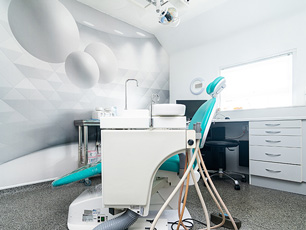Root canal therapy is necessary when the pulp, the soft tissue inside the tooth, becomes infected or damaged. This can happen due to untreated cavities, cracked or chipped teeth, or trauma to the tooth. If left untreated, the infection can spread to the surrounding tissues and cause severe pain, abscesses, and even tooth loss.
Some common signs that you may need a root canal include severe toothache, sensitivity to hot or cold temperatures, swelling and tenderness around the tooth, darkening of the tooth, and a recurring pimple on the gums. However, only a dentist can determine if a root canal is necessary after conducting a thorough examination.
Contrary to popular belief, root canal therapy is not as painful as people think. With modern advancements in dental technology and anesthesia, the procedure is relatively painless. Most patients report feeling minimal discomfort during and after the procedure. Your dentist will also prescribe medication to alleviate any post-operative pain or discomfort.
Emergency dental care is a form of medical treatment that is provided when a patient experiences an unexpected or severe dental issue that requires immediate attention. This type of dental care typically focuses on relieving pain and restoring the patient's oral health as quickly as possible. In many cases, emergency dental care can also help to prevent further damage or deterioration of the patient's teeth and gums. Common examples of circumstances in which emergency dental care may be necessary include broken teeth, lost fillings, abscesses, and impacted wisdom teeth. Emergency dentists are always available to provide urgent assistance for these types of issues. They offer a variety of treatments that range from root canals to crown replacements, depending on the severity and complexity of the problem.
Knowing when to seek emergency dental care is essential for protecting your oral health and avoiding further complications. In general, you should visit your emergency dentist if you are experiencing severe pain or bleeding in your mouth, have a broken tooth or filling, or need immediate treatment due to an infection. Additionally, if you have a lost crown or bridge, a cracked tooth, swelling in the face or neck area, or any other dental injury that requires urgent attention, it's important to get help as soon as possible.
If you are unsure whether your situation qualifies as an emergency, it's best to call a dentist and describe the symptoms you are experiencing. They can then advise you on the best course of action and provide further guidance about what steps to take next.
During an emergency dental appointment, the dentist will assess your situation and determine the best course of action. Depending on the severity of your condition, they may need to take X-rays to better understand what is going on. The dentist will also clean any debris from your teeth and gums before starting treatment. Common treatments for emergency cases include filling a cavity or tooth extraction. If needed, more complex procedures such as root canals and crowns may be performed in order to restore the health of your mouth.
Throughout the appointment, your dentist will explain each step of the process so you know exactly what is happening. They will also provide tips and advice about how to care for your teeth at home in order to avoid further complications or damage due to neglecting dental hygiene practices. It's important to follow all instructions given by your dentist in order to maintain good oral health and reduce the risk of needing another emergency appointment in future.
It is recommended to schedule your child's first dental visit around their first birthday or within six months after their first tooth appears. Early dental visits help familiarise your child with the dental office and allow the dentist to check for any potential issues.
Children should typically visit the dentist every six months for regular check-ups and cleanings. However, your dentist may suggest more frequent visits if your child has specific dental needs or is at a higher risk of dental problems.
Even though baby teeth will eventually fall out, it's crucial to care for them. Clean your child's gums with a soft cloth before their first tooth erupts, and once the teeth appear, use a child-sized toothbrush with a smear of fluoride toothpaste twice a day. Encourage your child to spit out the excess toothpaste but avoid rinsing as it helps to retain the fluoride.
Visiting the hygienist on a regular basis is an essential part of maintaining good oral health. A qualified dental hygienist can provide a range of treatments to help keep your teeth and gums healthy. By having your plaque and tartar professionally removed, you can avoid the build-up of bacteria in hard-to-reach places which can cause cavities, gum disease and other conditions.
In addition to removing plaque and tartar, your hygienist can also brighten up your smile with scaling and polishing techniques. Plus, they can give you tailored advice on how to look after your teeth properly at home with the right diet and regime for maintaining good oral hygiene. By visiting a hygienist regularly you can ensure that your teeth remain healthy, clean and free from decay or disease.
The frequency of dental hygiene visits is based on individual needs and can vary from every 3 to 12 months. Discussing your unique oral health needs with your dentist or hygienist is important. If you have good oral health, Preventative visits may be as infrequent as once a year. However, if you are prone to cavities or gum disease, more frequent cleanings may be recommended.
Your visit to the dental hygienist will usually start with an examination of your teeth and gums, followed by a professional cleaning. During the cleaning, your hygienist will use special tools to remove plaque and tartar that has built up on your teeth. This can help reduce the risk of decay, gum disease, and other oral health issues. After the cleaning, your hygienist may also polish your teeth and provide you with advice on how to keep your mouth healthy at home.
Gum disease, also known as periodontal disease, is primarily caused by the buildup of plaque on the teeth. Plaque is a sticky film of bacteria that forms on the teeth and gums, leading to inflammation and infection if not adequately removed.
The early signs of gum disease include redness, swelling, and bleeding gums during brushing or flossing. As the condition progresses, you may experience persistent bad breath, receding gums, tooth sensitivity, and even tooth loss.
Good oral hygiene practises are essential for preventing gum disease. This includes brushing your teeth at least twice a day, flossing daily, using mouthwash, and visiting your dentist regularly for professional cleanings. Quitting smoking, maintaining a healthy diet, and managing stress also contribute to gum health.
Composite bonding is a dental procedure that can help to improve the appearance of your teeth. This treatment uses a composite resin material that is bonded to the teeth to restore or enhance their shape, size, and colour.
One of the primary benefits of composite bonding is its ability to repair damaged or chipped teeth. It can also help to fill gaps between teeth and improve their alignment.
Composite bonding is an affordable and quick alternative to porcelain veneers or crowns. It is a non-invasive procedure that can be completed in a single visit to a cosmetic dentist.
During the treatment, the dentist will use a composite material to sculpt the desired shape of the tooth or teeth. The bonding material will then be applied to the teeth and hardened with a special curing light. Once the bonding material has cured, the dentist will refine the finish and polish the teeth to achieve a natural-looking, attractive result.
Composite bonding can be used to improve the appearance of discoloured teeth, creating a whiter smile. The bonding material can also be colour-matched to natural teeth, ensuring seamless integration with your existing smile.
With proper care and maintenance, composite bonding can provide a long-term, permanent solution for cosmetic issues such as chips, gaps, and discolouration. It is important to maintain good oral hygiene practices and avoid habits such as smoking or excessive alcohol consumption to ensure the longevity of your composite bonding treatment.
Consult an expert cosmetic dentist to learn more about composite bonding and its suitability for your dental needs. With the help of a friendly team of experts, you can achieve a brighter, healthier smile in no time.
If you're considering composite bonding as a solution for your cosmetic dental issues, one of the primary questions you may have is whether or not the process is painful. The good news is that composite bonding is a relatively pain-free dental procedure that can provide impressive results.
During the composite bonding process, your dentist will first numb the areas of your mouth that will be worked on. This is typically done using a local anaesthetic, which will prevent you from feeling any pain or discomfort during the procedure.
Once the numbing has taken effect, your dentist will begin the bonding process. They will use a composite resin material to sculpt and shape the bonding material onto your teeth, filling in gaps or repairing chips or other cosmetic issues.
While the bonding process itself is not typically painful, it's worth noting that you may experience some sensitivity or discomfort after the procedure. This is due to the fact that the composite resin material can slightly alter the shape of your teeth, which can cause some initial discomfort.
However, this discomfort is usually temporary and can be managed with over-the-counter pain relief medication, such as ibuprofen. Additionally, your dentist may recommend using a sensitive toothpaste or avoiding hot or cold foods and drinks for a short period after the bonding process.
Overall, composite bonding is a minimally invasive, pain-free dental procedure that can provide impressive results. If you're still concerned about any potential discomfort, it's always a good idea to discuss your concerns with your dentist before the procedure so that they can address any potential issues and help you feel more comfortable throughout the process.
Composite bonding has become an increasingly popular dental procedure for a wide range of individuals who are looking to address cosmetic issues with their teeth. This treatment is recommended for individuals who are looking for a simple and affordable option to improve the appearance of their smile without undergoing invasive procedures or breaking the bank.
Composite bonding is best suited for those who have minor cosmetic issues, such as chipped or broken teeth, small gaps, or discoloured teeth. It is a fantastic alternative to traditional cosmetic dentistry treatments that may require more time and resources, such as dental crowns or bridges.
If you are looking to restore your teeth to their original appearance, composite bonding may be the perfect choice for you. It is always best to discuss your options with an experienced and qualified cosmetic dentist, who can help you determine if this procedure is right for your unique needs and goals.
Professional bleaching involves the use of special whitening products that contain higher concentrations of hydrogen peroxide or carbamide peroxide. The dentist will apply these products to your teeth and activate them with a special light or laser for maximum whitening effect. This method can produce dramatic results in a single visit, but you may require multiple visits to achieve your desired level of whitening.
Yes, teeth whitening is a safe procedure when done under the supervision of a dental professional. However, if you choose to use at-home whitening kits, it is important to follow the instructions carefully to avoid damaging your teeth or gums.
The results of teeth whitening can vary depending on the individual and the type of treatment used. Generally, the effect of teeth whitening lasts between 6 months to 2 years.
Orthodontics is a branch of dentistry that focuses on the diagnosis, prevention, and correction of dental and facial irregularities. Orthodontic treatment involves the use of braces, wires, and other appliances to straighten teeth, correct bite problems, and improve dental and facial aesthetics.
The length of orthodontic treatment varies depending on the severity of the dental and orthodontic issues being addressed. The average treatment time for traditional metal braces is two to three years, but some cases may take longer or shorter.
Braces can be uncomfortable, but they shouldn't be painful. Most people experience some soreness or discomfort for a few days after the braces are first placed and after each adjustment appointment. Over-the-counter pain medications, such as ibuprofen, can help alleviate any discomfort.



We are conveniently located in Dorset between A35 and A31, across the street from the Bere Regis Doctor's Surgery. There is plenty of free parking available.
| Monday & Thursday | 08.00 to 19.00 |
| Tuesday | 09.30 to 14.00 |
| Wednesday | 09.30 to 17.00 |
| Friday | By appointment |
| Saturday | By appointment |



Contact us to enquire and indulge in high-quality dental services. As a bonus, FREE dental care for children under the age of 10 if you are a registered patient with us and attend the surgery for treatment regularly.
Get in touch2 The Old Stables Manor Farm Road
Bere Regis, Wareham BH207HD
Call us: 01929 471023
Email: info@bereregisdental.co.uk
Esthet Dent Ltd trading as Bere Regis Dental Practice is an Introducer Appointed Representative of Chrysalis Finance Limited, which is authorised and regulated by the Financial Conduct Authority. Bere Regis Dental Practice is a credit broker, not a lender. The provider of a payment scheme which is not offered through or by Chrysalis Finance Limited may not be so authorised and regulated.